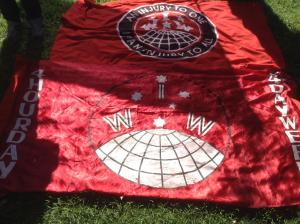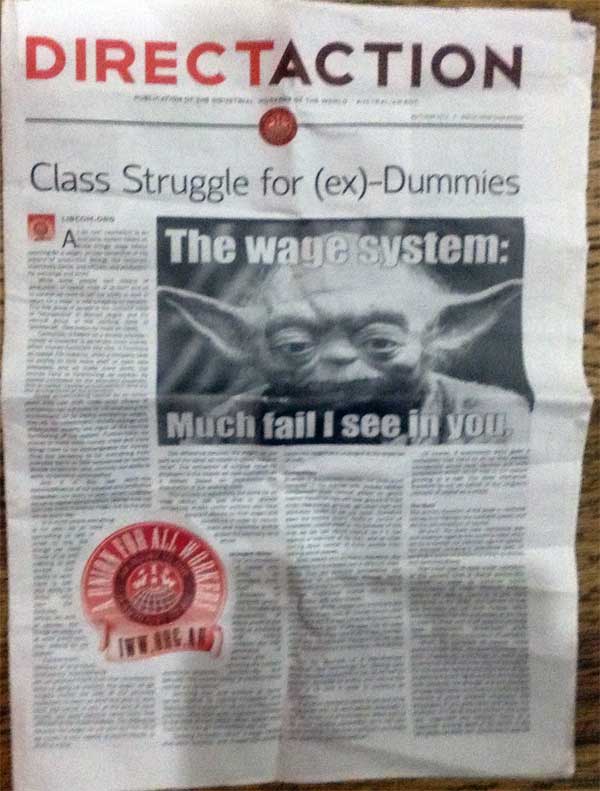 A Irish emigrant to Australia and WSM supporter gives his story about working on building sites, unions and audio conversation with IWW. - The Industrial Workers of the World from the Americas to Australasia have historically formed the bedrock of a radical revolutionary tendency in the labour movement, fanning the flames of class war fighting for a radical union where power resides in at its base asserting the need to abolish wage slavery where workers take full control over their labour.
A Irish emigrant to Australia and WSM supporter gives his story about working on building sites, unions and audio conversation with IWW. - The Industrial Workers of the World from the Americas to Australasia have historically formed the bedrock of a radical revolutionary tendency in the labour movement, fanning the flames of class war fighting for a radical union where power resides in at its base asserting the need to abolish wage slavery where workers take full control over their labour.
From its inception in Chicago in 1905 anarchists along with many other left currents or none were naturally attracted to its ranks as the battle lines between labour and capital were unravelled; fighting for a new world in the shell of the old.
Arriving in Australia I soon joined the ‘Wobblies’ as I found it best suited my needs rather than the mainstream unions. From working in casual employment in the construction industry involving every form of work from unskilled labouring, to ‘lashing’ to working on the docks where I could be in three different building sites in one week.
Although union sites offer much better wages and conditions, they have little interest in organising the rest of us who find ourselves in low skilled and precarias employment. ' Solidarity Unionism’ is more appealing and a contemporary articulation of Wobbly principles of organising on the job instead of reliance of paid union organisers where the initiative and power resides in the rank and file.
‘Solidarity Unionism is labour organising in its most basic, most powerful form. Deemphaising or avoiding government certification altogether, a solidarity union is simply a group of workers who come togther, support each other other’s development as leaders, and carry out their own direct action campaigns around issues of concern at work such as unsafe speed lines, poverty wages, and abusive management.’(1)
As the labour movement and capitalism creates a growing permanent casualised workforce we need to examine past struggles not only for inspiration but to meet the challenges we face today. Unlike the old yellow union model where once you leave your job you lose a member, the Wobbly model of remaining a member when you change job is much more suitable to the labour market today. This weakness of casual employment can be turned into source of strength by spreading ideas and organising models.
Over a 100,000 mainly young people left Ireland last year with many of them arriving in Australia forming another generation as about 1/3 of, Australians already claim Irish ancestry. While for many the desire of finding a high paid job in the ‘resources boom ‘ in mining became a reality. For many others working in conditions of 12 hour days for 4 weeks on, 1 week off is a short term fix of an industry highly dependent of the Chinese economy. While the experience of nice beaches and good lifestyle has been hugely positive and furfilling the reality of working in low paid, casual employment for many migrant workers with little rights and no access to social security is often swept under the carpet.
In one particular case covered in the Australian Irish Echo, one Irish backpacker was so scared during her 3 month’s regional work to obtain her second year visa she slept with a knife under her bed under threat from the male owner of the cattle farm. After fleeing from the farm, Jessica Riley, 24, told the Irish Echo, ‘There’s not even a safety net out there for backpackers. We have no rights out there to say we cant be exploited.’(2)
Interview with the IWW in Sydney about the IWW, aboriginal land struggles & Sydney university strike by Workers Solidarity on Mixcloud
After a recent meeting regarding setting up a Sydney solidarity network (3) based on the Seattle experience, I took the opportunity to discuss the relevance of the IWW today, the importance of linking aboriginal land struggles and fighting racism to the wider class struggle. The legacy of colonialism is as relevent as ever in light of a recent report highlighting a rise aboriginal deaths in custody over 20 years on from the first royal commission report. Australian Institute of Criminology released a report yesterday saying the number of indigenous deaths had increased over the past five years. In 2011, indigenous people represented just over one in four people in prison and one in five deaths which shows a clear over representation in comparisons to non- aboriginal people. Included in the discussion include the impact of the 'resources
boom' and the ongoing wobbly involvement in the Sydney university strike.
There was also a brief contribution from Yu a migrant worker from Taiwan who joined the IWW after receiving support after her unfair dismissal for demanding her rights. Yu discusses the rising workers movement in South East Asia and anarchism.
1) P 242, Rebel Voice: An IWW Anthology
2) Irish Echo, Edition May 8-21 2013. P3
3) www.sydsol.net.
 A Irish emigrant to Australia and WSM supporter gives his story about working on building sites, unions and audio conversation with IWW. - The Industrial Workers of the World from the Americas to Australasia have historically formed the bedrock of a radical revolutionary tendency in the labour movement, fanning the flames of class war fighting for a radical union where power resides in at its base asserting the need to abolish wage slavery where workers take full control over their labour.
A Irish emigrant to Australia and WSM supporter gives his story about working on building sites, unions and audio conversation with IWW. - The Industrial Workers of the World from the Americas to Australasia have historically formed the bedrock of a radical revolutionary tendency in the labour movement, fanning the flames of class war fighting for a radical union where power resides in at its base asserting the need to abolish wage slavery where workers take full control over their labour.

